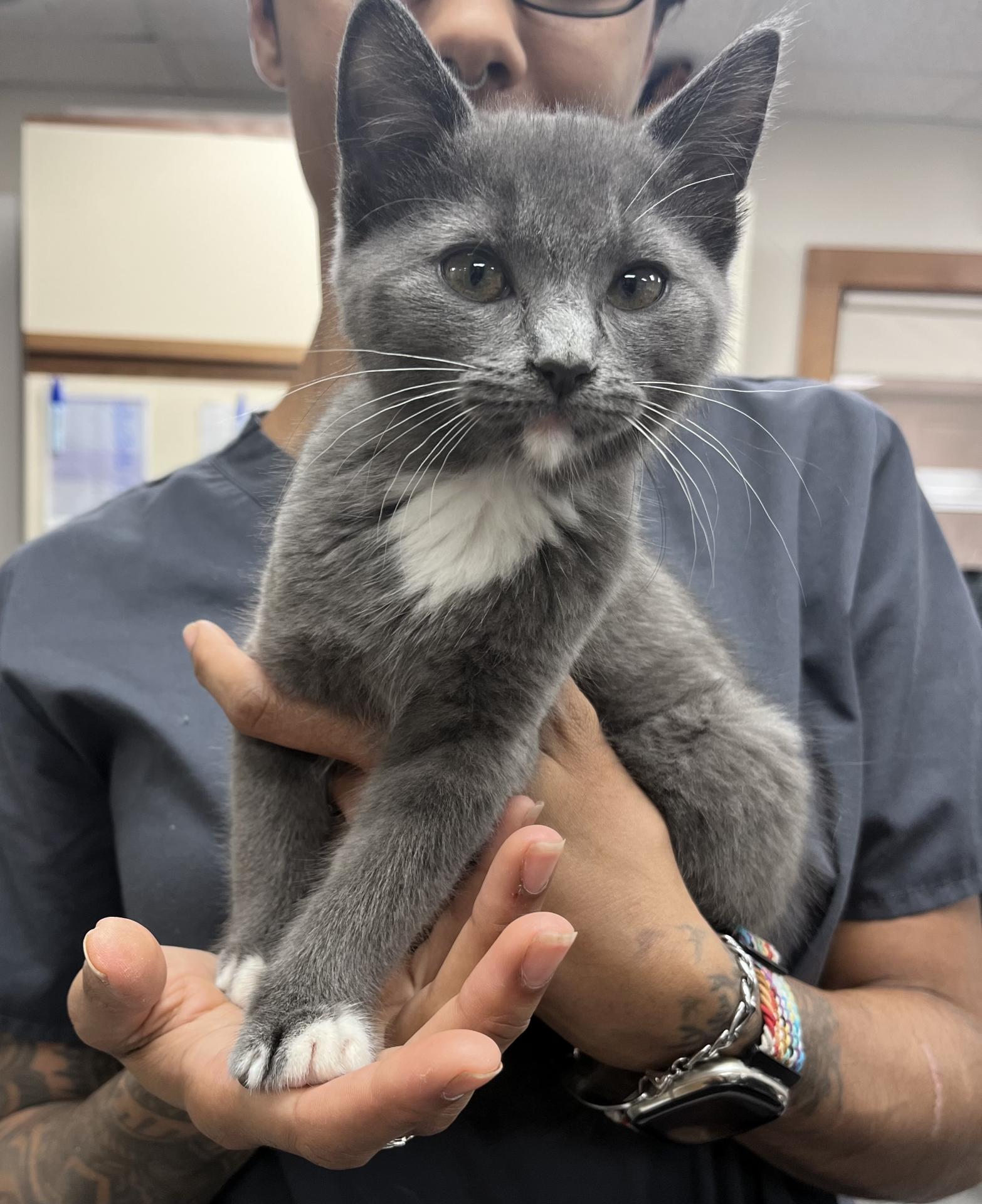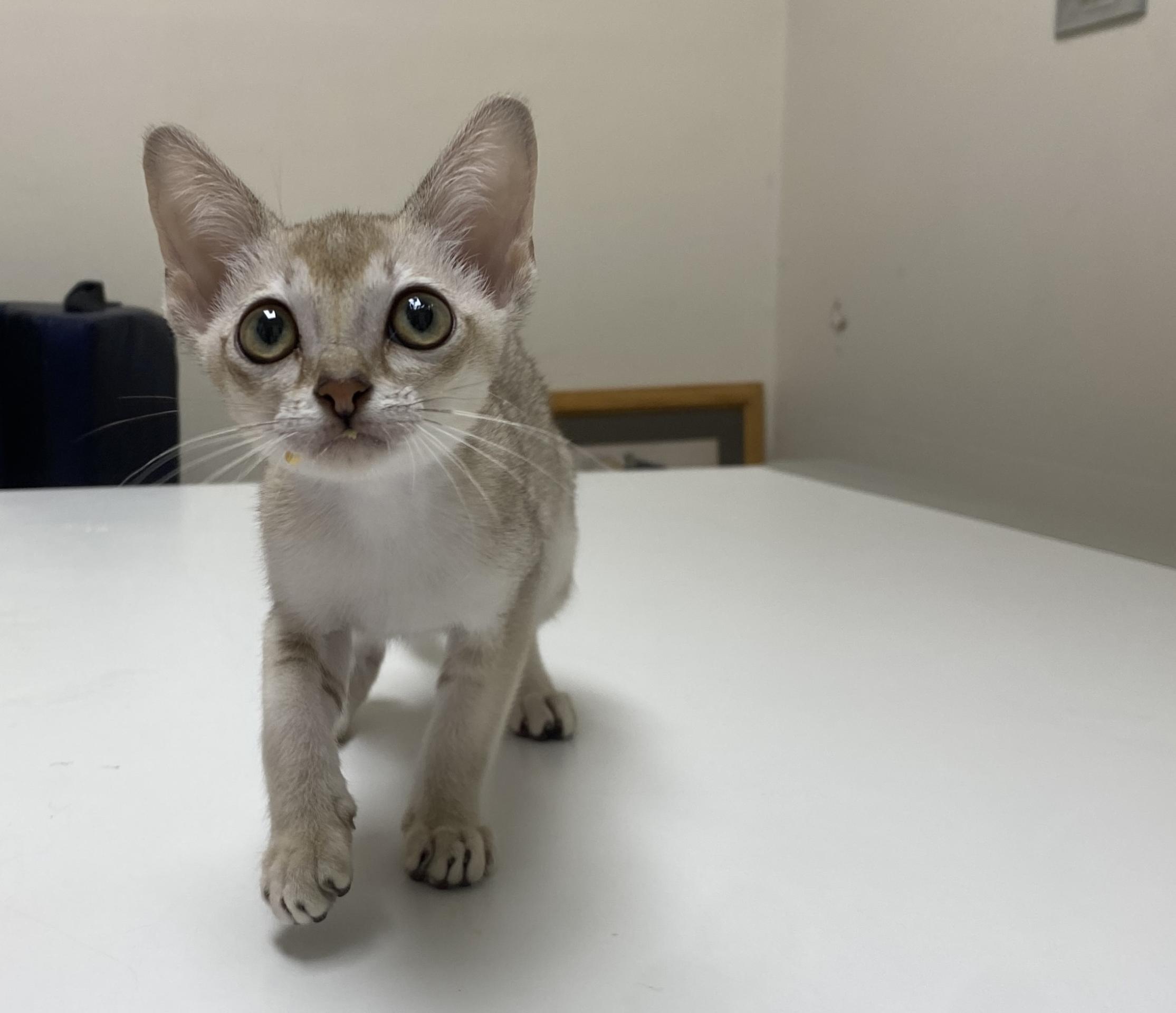So, you've got a kitten! What happens at that first vet visit?
 At each visit, your veterinarian will perform a thorough physical exam. This includes checking your kitten from nose to tail and discussing their overall health and development. Special attention is given to things like:
At each visit, your veterinarian will perform a thorough physical exam. This includes checking your kitten from nose to tail and discussing their overall health and development. Special attention is given to things like:
-
How your kitten’s adult teeth are coming in
-
Checking for umbilical hernias
-
Listening for heart murmurs
-
Monitoring growth and development of reproductive organs
We’ll also talk about scheduling a check-up around 10 months of age, which is when your kitten starts transitioning into adulthood. This is a great time to go over switching to adult food, how much to feed, and keeping up with flea and heartworm prevention.
When does your little kitten need their shots?
Vaccines help protect your kitten from serious (and sometimes deadly) diseases. They work best when given on a schedule, usually at:
-
6–8 weeks
-
12 weeks
-
16 weeks
When kittens nurse, they get immunity from their mother. But that protection fades between 6–16 weeks, which is why timely vaccines are so important.
Core Vaccines:
-
FVRCP (Feline Distemper): Protects against three major viruses that cause respiratory and intestinal illness.
-
Rabies: A deadly virus that affects the nervous system and can be passed to people and other animals.
Non-Core (But Highly Recommended) Vaccine:
-
Feline Leukemia Virus (FeLV): Recommended for all kittens, especially those who may go outside or live with other cats. This virus weakens the immune system and can lead to cancer or anemia.
Note: We strongly recommend testing all kittens for feline leukemia and FIV (feline AIDS). Even indoor kittens can sneak outside and get exposed.
Fleas and ticks: Do I really need to worry about them with a kitten?
 Fleas and ticks are more than just annoying — they can cause serious health problems. Fleas can transmit tapeworms and cause skin allergies or anemia. Ticks can carry diseases, and even though Lyme disease isn’t common in cats, they can bring ticks into your home.
Fleas and ticks are more than just annoying — they can cause serious health problems. Fleas can transmit tapeworms and cause skin allergies or anemia. Ticks can carry diseases, and even though Lyme disease isn’t common in cats, they can bring ticks into your home.
Once a flea jumps on your kitten, it starts feeding almost immediately and can lay thousands of eggs. These eggs can hatch in your home weeks or even months later.
To protect your kitten:
-
Use a product labeled safe for kittens under 4 months
-
Avoid over-the-counter or unsafe treatments — cats are very sensitive
-
We recommend Revolution PLUS for reliable flea, tick, and parasite protection
Tummy troubles? What about those pesky intestinal parasites?
Parasites are very common in kittens and can cause symptoms like:
-
Diarrhea
-
Vomiting
-
Bloated belly
-
Poor coat condition
-
Weight loss
Here are the most common ones:
-
Roundworms: Very common, often passed from the mother. They can infect humans, especially children.
-
Hookworms: Cause anemia and can infect humans through the skin.
-
Coccidia: Causes diarrhea, especially in young kittens.
-
Tapeworms: Usually not harmful but can be transmitted by fleas or eating infected prey.
-
Giardia: Found in contaminated water or environments, can cause diarrhea and weight loss.
Many of these parasites can also affect humans, so treatment and prevention are important.
Why should I spay or neuter my kitten?
Spaying or neutering your kitten has many benefits:
-
Prevents unwanted litters
-
Helps control the pet population
-
Reduces the risk of certain cancers and infections
-
Can reduce problem behaviors (spraying, yowling, roaming)
We typically recommend having this done around 6 months of age. The procedure is very safe and is one of the most common surgeries performed in veterinary medicine.
Want a happy kitten? Here are some top tips!
 The key to raising a well-adjusted cat is early socialization. Between 2 and 12 weeks of age, your kitten is more open to learning and exploring. Positive experiences during this time help them become confident adults.
The key to raising a well-adjusted cat is early socialization. Between 2 and 12 weeks of age, your kitten is more open to learning and exploring. Positive experiences during this time help them become confident adults.
Tips for a happy kitten:
-
Provide toys for play and mental stimulation
-
Offer scratching posts and cozy sleeping spots
-
Use multiple litter boxes (one per cat, plus one extra)
-
Scoop daily and clean boxes every 3–4 weeks
If you decide to let your cat go outdoors, remember:
-
Outdoor cats are exposed to more risks (disease, predators, cars)
-
Vaccinate for FeLV and use monthly parasite prevention
-
Always microchip and use a breakaway collar with ID
What's the best food to keep my kitten healthy and growing?
Feed your kitten a high-quality diet labeled “complete and balanced” for growth. Brands like Purina ProPlan, Science Diet, Iams, and Purina One are good choices.
-
Feed kitten food until 8–12 months of age or until spayed/neutered
-
Avoid free-feeding to prevent obesity
-
A typical amount is about ¼ cup twice daily — ask your vet for exact recommendations
Microchips: What are they, and should my kitten get one?
Microchips are small devices (about the size of a grain of rice) inserted under your pet’s skin. They are safe, permanent, and painless to insert. This chip can be scanned at shelters or vet clinics to reunite lost pets with their families.
Don’t forget to register the chip! A chip that isn’t registered won’t help your pet get back home.
We often recommend microchipping at the same time as spaying or neutering.
Is pet insurance really worth it for a new kitten?
Having pet insurance can really help if your kitten ever gets sick or injured. We recommend checking out:
You can also visit PetInsuranceReview.com to compare plans and read reviews to find the best fit for your needs.
At Hampton Veterinary Hospital, we’re here to help you every step of the way—from choosing the right food to mastering housetraining and exploring pet insurance options. Our team is passionate about supporting you and your puppy through every milestone. Have questions or need personalized guidance? Call us today at 603) 926-7978!

